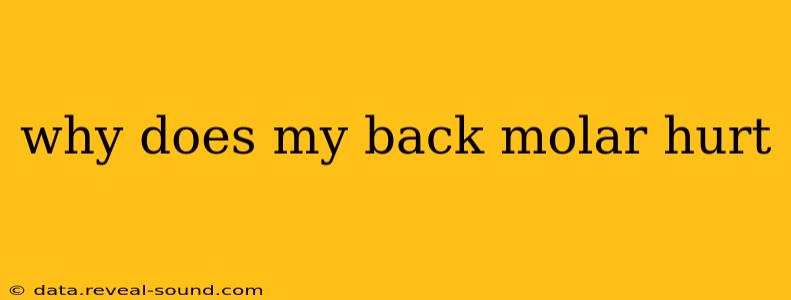A throbbing ache in your back molar can be incredibly disruptive, making eating, sleeping, and even talking uncomfortable. Pinpointing the exact cause requires a visit to your dentist, but understanding the potential culprits can help you prepare for your appointment and manage the pain in the meantime. This guide explores common reasons for back molar pain, offering insights into potential causes and suggesting steps you can take.
What Could Be Causing My Back Molar Pain?
This is the most common question people have when faced with back molar discomfort. The pain's location alone doesn't give a definitive answer, as several issues can manifest similarly. Let's explore some of the most frequent causes:
Cavities (Dental Caries):
Cavities are one of the most frequent culprits behind molar pain. Bacteria in plaque produce acids that erode tooth enamel, leading to cavities that can reach the tooth's nerve, causing intense pain. The pain may be sharp, throbbing, or a dull ache, often worsening with hot or cold temperatures or sweet foods.
Gum Disease (Periodontitis):
Inflammation and infection of the gums can spread to the supporting structures of your teeth, including the bone. This can lead to pain, especially in the molars, which often bear the brunt of chewing forces. Signs of gum disease include redness, swelling, bleeding gums, and persistent bad breath.
Abscess:
A dental abscess is a pocket of pus that forms at the root of a tooth due to infection. This can cause severe pain, swelling, and sensitivity to touch. An abscess needs urgent dental attention as it can spread infection.
Cracked Tooth:
A crack or fracture in a molar, even a microscopic one, can be extremely painful. This is often triggered by chewing hard foods or grinding your teeth (bruxism). The pain can vary, sometimes only occurring when biting down.
Teeth Grinding (Bruxism):
Many people grind their teeth unconsciously, especially at night. This puts immense pressure on the molars, potentially leading to cracks, worn enamel, and significant pain.
Impacted Wisdom Teeth:
Wisdom teeth (third molars) often emerge partially or become impacted, causing pain and inflammation in the surrounding area. The pressure from an impacted wisdom tooth can affect neighboring molars.
Sinus Infection:
While less common, a sinus infection can sometimes cause referred pain to the upper molars. The proximity of the maxillary sinuses to the roots of the upper molars means inflammation can be felt in the teeth.
Temporomandibular Joint Disorder (TMJ):
TMJ disorders affect the jaw joint, leading to pain in the jaw, face, and even the ears. This pain can sometimes radiate to the molars.
How Can I Treat My Back Molar Pain?
Over-the-counter pain relief: Nonsteroidal anti-inflammatory drugs (NSAIDs) like ibuprofen can help manage pain and inflammation until you see your dentist.
Rinsing with salt water: This can help clean the area and reduce inflammation, providing temporary relief.
Avoid chewing on the affected side: This reduces pressure and discomfort.
Cold compress: Applying a cold compress to the affected area can numb the pain and reduce swelling.
However, it’s crucial to remember that self-treatment is only a temporary measure. You should schedule an appointment with your dentist as soon as possible to get a proper diagnosis and treatment plan.
When Should I See a Dentist Immediately?
Severe pain, swelling, fever, or difficulty opening your mouth warrants immediate dental attention. Don't delay seeking professional help if you experience any of these symptoms.
By understanding the potential causes of back molar pain and taking prompt action, you can get the relief you need and prevent more serious complications. Remember, regular dental checkups are key to maintaining good oral health and preventing many of these issues.
